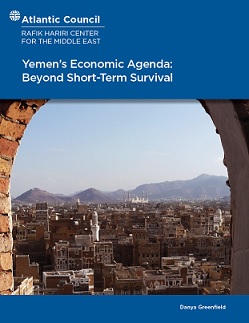Yemeni and international stakeholders need to turn their attention to the economic sphere—even while continuing to usher the National Dialogue through to completion—if the political transition has any hope of success. Without delivering some improvement in the standard of living, generating economic activity, and addressing baseline needs for survival, President Abdrabo Mansour Hadi and the Yemeni government risk losing all remaining credibility among its people and an unraveling of the delicate gains made to date.
 For more on the Yemen’s political transition and the need for economic gains to secure its success, read Danya Greenfield’s latest report, Yemen’s Economic Agenda: Beyond Short-Term Survival. Click here to download the report. |
Yemen’s National Dialogue is lurching backward and forward, and it is far from clear how the country will move to the next stage in its transition. The National Dialogue—outlined by the Gulf Cooperation Council (GCC) agreement that removed former president Ali Abdullah Saleh from power in 2011—was intended to be a six-month process to resolve the country’s most pressing problems with broad representation of political parties, youth, women, and civil society. But more than eight months after its start, the key issue related to the South and the shape of the state remain unresolved with no clear resolution in sight. It is unsurprising that in the final weeks, potential spoilers—those who seek to preserve their hold on power—would rear their ugly heads and seek to undermine the Dialogue’s success and any potential change in the fragile balance that reigns to date.
The delay in concluding the National Dialogue is dangerous for multiple reasons; the longer it drags on, the more potential there is for violence and the more opportunity there is for status quo forces to scuttle its success. This applies to Saleh family members and allies, tribal and religious leaders tied to the Islah party, military leaders who benefit from simmering conflict, and Southern leaders insisting on secession—each has something to gain from ongoing instability and a patronage system that benefits a web of elites across the spectrum. Perhaps more importantly, the endless negotiation among various power brokers and National Dialogue committees means that Yemeni leaders continue to focus on narrow political interests and neglect the most basic needs of Yemeni citizens: food security, employment, and service delivery.
The initial idea with the GCC agreement was to establish a transitional government, undertake the National Dialogue, move to constitution drafting, and conclude with a constitutional referendum and national elections. This sequence made sense at the time, but the delay with the National Dialogue now holds every other step in the process hostage. While the country’s survival does not hinge upon a new constitution or parliament, it does depend on having an effective, accountable, competent government and sadly, this is what is lacking. The very structure of the transitional government—a 50/50 split between the former ruling General People’s Party (GPC) and the opposition Joint Meeting Parties (JMP)coalition—meant that ministers were selected based on party loyalty and position rather than merit, and that internal competition for power prevents meaningful action from being taken. While the split government allows for political balance and a sense of equity among the major political factions, it has stymied the development of a unified vision for the cabinet to pursue. Hadi is a respected figure, but Prime Minister Mohammed Basindwa has not demonstrated leadership with the cabinet, and the government is viewed as a relatively weak body whose mandate is limited to implementing what the GCC deal dictates. The lack of leadership is felt acutely in the economic sphere.
What is needed now more than anything is a new government that has a vision to lead the country forward. The International Monetary Fund is eager to work with the Yemeni government on a medium-term arrangement that would provide much-needed financing in the context of an economic reform agenda, but it needs a partner on the other side. One way around this lack of leadership and coherence is to form an Economic Cabinet, which would include the ministers and deputy ministers from relevant ministries, along with five or six outside economists or policy analysts to provide economic guidance and advice. In order to mitigate internal power struggles, the chairperson could be elected from among the external experts and be empowered to set the agenda and call meetings. Forming such an economic council that includes, rather than sidelines the ministers, would provide much-needed, nonpartisan advice to the president on economic policy and could provide some political cover for tough decisions.
The current discussion in the National Dialogue regarding decentralization and federalism could introduce a new kind of regional economic approach that might impact the arrangement of sharing natural resources and tax revenue in a federal system. However, the basic components of how Yemen’s economy must shift will remain unchanged—diversification, fiscal rebalancing, subsidy reform, labor-oriented growth—regardless of the Dialogue’s outcome. Presumably, the central government will maintain some key economic planning functions, and Yemen cannot afford to wait until the final parameters of a federal system are determined to start building consensus for these reforms. For the Yemeni government to effectively rebuild the economy and restructure the country, powerful interests and a well-entrenched patronage network will need to be confronted. In this case, good intentions will not be sufficient, rather strong political will is needed. This pressure can come from both domestic and external actors, and even while the National Dialogue consumes a great deal of energy, the international community can play a pivotal role in galvanizing momentum and attention toward greater economic focus.
Danya Greenfield is the acting director of the Rafik Hariri Center for the Middle East.
